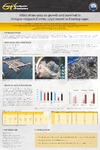Please use this identifier to cite or link to this item:
https://accedacris.ulpgc.es/jspui/handle/10553/5512
| Title: | Effect of sex ratio on growth and survival in Octopus vulgaris (Cuvier, 1797) reared in floating cages | Authors: | Estefanell, J. Socorro Cruz, Juan Antonio Guirao Guijarro, Rafael Fernandez-Palacios, H. Izquierdo, Marisol Roo, Javier |
UNESCO Clasification: | 251092 Acuicultura marina | Keywords: | Pulpo | Issue Date: | 2010 | Abstract: | Octopus vulgaris is a potential candidate to diversify European aquaculture for its rapid growth and high market prices (Vaz Pires et al. 2004). One factor affecting industrial development of octopus culture is sexual maturation under rearing conditions. Octopus females can lose up to 30-60% of their initial body weight during egg-laying (Iglesias et al., 2000) and die after the paralarvae hatch (Guerra,1992), while a correlation between males death and spermatic sac depletion has being recently reported by Estefanell et al. (2010b). The present experiment discusses the effect of three different sex ratios on growth, sexual maturation and survival in O. Vulgaris. Conclusions: Discarded bogue from fish farms could be used as alternative diet for the final stage of O. vulgaris ongrowing ; Male segregation would maximize biomass increment ; Under the conditions described, sex ratios close to 1:1 produced higher biomass increment than 4:1 | URI: | https://accedacris.ulpgc.es/handle/10553/5512 | DOI: | 10.13140/2.1.3784.4489 | Source: | Aquaculture Europe 2010, Porto, Portugal, october 5-8 | Rights: | by-nc-nd |
| Appears in Collections: | Póster de congreso |
Page view(s)
59
checked on Jan 10, 2026
Download(s)
23
checked on Jan 10, 2026
Google ScholarTM
Check
Altmetric
Share
Export metadata
Items in accedaCRIS are protected by copyright, with all rights reserved, unless otherwise indicated.
